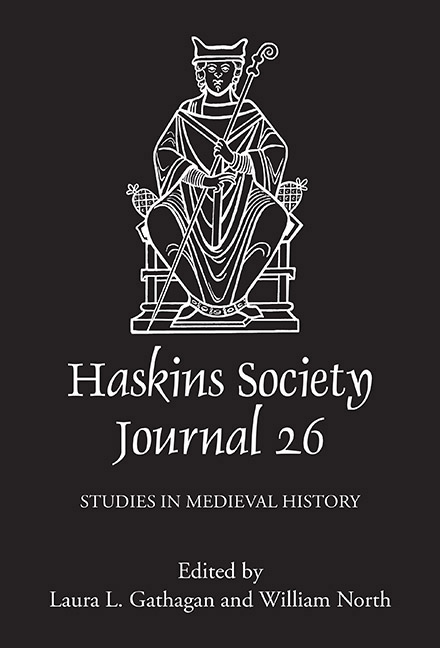Book contents
- Frontmatter
- Contents
- List of Figures
- Editors’ Note
- Abbreviations
- 1 Mores Tuos Fabricae Loquuntur Building Activity and the Rhetoric of Power in Ostrogothic Italy
- 2 A Hermeneutical Feast: Interreligious Dining in Early Medieval Conciliar Legislation
- 3 A Hypothetical Slave in Constantinople: Amalarius’s Liber Officialis and the Mediterranean Slave Trade
- 4 Welsh Kings at Anglo-Saxon Royal Assemblies (928–55)
- 5 The Diplomatics of Depredation: Reconsidering Holy Trinity Caen’s List of Losses
- 6 When Did Robert of Torigni First Receive Henry of Huntingdon’s Historia Anglorum, and Why Does It Matter?
- 7 A Coin Bearing Testimony to Duchess Matilda as Consors Regni
- 8 Fighting to be the Tallest Dwarf: Invidia and Competition in the Self-Conception of Eleventh- and Twelfth-Century Masters
- 9 Brut y Tywysogion: the History of the Princes and Twelfth-Century Cambro-Latin Historical Writing
- 10 The Use of English Annalistic Sources in Medieval Welsh Chronicles
- 11 A Franco-Danish Marriage and the Plot against England
9 - Brut y Tywysogion: the History of the Princes and Twelfth-Century Cambro-Latin Historical Writing
Published online by Cambridge University Press: 25 May 2021
- Frontmatter
- Contents
- List of Figures
- Editors’ Note
- Abbreviations
- 1 Mores Tuos Fabricae Loquuntur Building Activity and the Rhetoric of Power in Ostrogothic Italy
- 2 A Hermeneutical Feast: Interreligious Dining in Early Medieval Conciliar Legislation
- 3 A Hypothetical Slave in Constantinople: Amalarius’s Liber Officialis and the Mediterranean Slave Trade
- 4 Welsh Kings at Anglo-Saxon Royal Assemblies (928–55)
- 5 The Diplomatics of Depredation: Reconsidering Holy Trinity Caen’s List of Losses
- 6 When Did Robert of Torigni First Receive Henry of Huntingdon’s Historia Anglorum, and Why Does It Matter?
- 7 A Coin Bearing Testimony to Duchess Matilda as Consors Regni
- 8 Fighting to be the Tallest Dwarf: Invidia and Competition in the Self-Conception of Eleventh- and Twelfth-Century Masters
- 9 Brut y Tywysogion: the History of the Princes and Twelfth-Century Cambro-Latin Historical Writing
- 10 The Use of English Annalistic Sources in Medieval Welsh Chronicles
- 11 A Franco-Danish Marriage and the Plot against England
Summary
Brut y Tywysogion is a source of fundamental importance to medieval Welsh and British history, but discussion of the chronicle in and of itself has been relatively limited. This paper will first discuss the nature of the chronicle, or more accurately the family of closely related chronicles that can be grouped under the title Brut y Tywysogion. The aim is to establish that the chronicle often preserves many features of older source material, and that consequently there is little basis for seeing the entirety of the work as the product of expansion and literary elaboration on the part of a late thirteenth-century compiler, as was the opinion of the Brut's editor, Thomas Jones. This will then enable close consideration of a distinctive section of the chronicle narrating the first quarter of the twelfth century. It has been argued elsewhere that this section is derived from a near contemporary account written before 1127. Discussion of the text's depiction of contemporary Welsh and English kingship will demonstrate that the ambiguous political sympathies of its author place him firmly in the complex and divided world of Wales in the early twelfth century. Comparison with his contemporaries as historians will also illustrate how this work fits into the context of twelfth-century historical writing more generally.
Brut y Tywysogion, often translated as the Chronicle of the Princes but more accurately the History of the Princes, is the name given to three closely related chronicles in Middle Welsh. The generally accepted explanation for their interrelationship is that they are three independent translations derived from a Brut y Tywysogion is a source of fundamental importance to medieval Welsh and British history, but discussion of the chronicle in and of itself has been relatively limited. This paper will first discuss the nature of the chronicle, or more accurately the family of closely related chronicles that can be grouped under the title Brut y Tywysogion. The aim is to establish that the chronicle often preserves many features of older source material, and that consequently there is little basis for seeing the entirety of the work as the product of expansion and literary elaboration on the part of a late thirteenth-century compiler, as was the opinion of the Brut's editor, Thomas Jones.
- Type
- Chapter
- Information
- The Haskins Society Journal 262014. Studies in Medieval History, pp. 209 - 228Publisher: Boydell & BrewerPrint publication year: 2015
- 31
- Cited by

